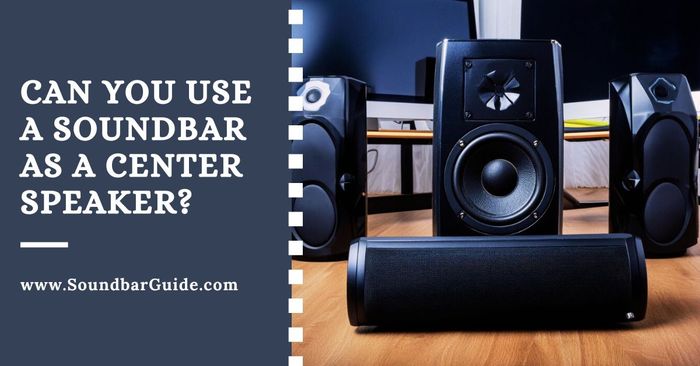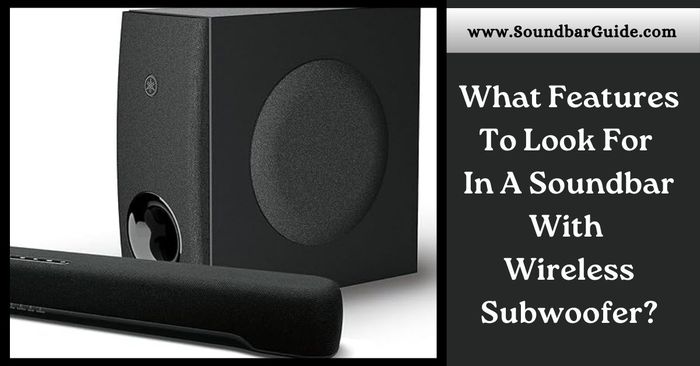Soundbars have revolutionized home audio with their sleek designs and straightforward installation.
They are usually standalone audio solutions designed to enhance television audio, but some audiophiles might wish to integrate them into a larger surround sound system.
Using a soundbar as a center channel speaker can bridge the gap between a full home theater setup and the minimalist approach of using just a soundbar.
So, can you use a soundbar as a center speaker?
Yes, you can use a soundbar as a center speaker if your soundbar and receiver both support such a configuration. This setup requires proper connection and compatibility.
Keep in mind that a soundbar can serve as a center speaker effectively, provided it has the right input options and aligns well with the rest of your audio components.
This unconventional use of a soundbar demands technical know-how to ensure seamless integration with existing surround sound systems.
In the following, I am going to share a detailed discussion on using a soundbar as a center speaker.
For a precise about this topic, you must pay a higher attention while studying the following discussion.
So, let’s dive in…
Table of Contents
Soundbars And Center Speaker Basics
Soundbars bring cinema sound to your home. They are sleek, compact, and offer a simple setup. A soundbar includes multiple speakers in one unit. This design improves sound quality over TV speakers. Most have built-in amplifiers for better audio from shows, movies, and games.
The Role Of A Center Speaker
The center speaker is crucial in a home theater.
- It sits below or above the TV.
- Its job is to make dialogue clear.
- It also carries central sounds in a movie.
- This creates a balanced audio experience.
Soundbars In Home Audio Systems
Soundbars often double as center speakers in home setups.
- They fit well in small spaces.
- They combine left, center, and right audio channels.
- This makes soundbars an all-in-one solution.
- Easy to install and use
- Space-saving design
- Enhanced audio over TV speakers
- Can be used as standalone or part of a larger system
Key Features Of Soundbars
A soundbar can dramatically enhance your home audio experience. Understanding the key features of soundbars is essential before integrating one as a center speaker in your setup.
Integration Technology
Wireless connectivity options such as Bluetooth or Wi-Fi are common in soundbars, allowing for easy pairing with various devices. Modern soundbars come equipped with HDMI ARC, enabling control of the soundbar using your TV’s remote. Smart soundbars offer compatibility with voice assistants and app control for added convenience.
- Bluetooth and Wi-Fi for seamless streaming
- HDMI ARC feature for simplified connections
- Compatibility with voice assistants
- Control through dedicated mobile apps
Sound Quality And Directionality
The sound quality of a soundbar is a pivotal aspect for your audio experience. The majority of soundbars deliver clear dialogue and rich bass, often with built-in subwoofers.
Soundbars are designed to project sound more broadly across a room, which enhances stereo separation and sound stage. Some models include Dolby Atmos technology for a more immersive, three-dimensional audio effect.
| Feature | Benefit |
|---|---|
| Built-in Subwoofers | Deep, punchy bass |
| Dolby Atmos | Immersive surround sound |
| Wide Sound Dispersion | Room-filling audio |
Ultimately, a soundbar with the right features can serve as a powerful center speaker, greatly improving the audio performance of your home theater system.
Soundbars Vs. Traditional Center Speakers
Choosing between a soundbar and a traditional center speaker is a big decision for your home theater.
Let’s weigh soundbars against traditional center speakers to help you decide…
Design Differences
Soundbars offer a sleek, minimalist look that blends easily with modern TVs. They are long, slim, and you can place them right below your screen. This space-saving design is perfect for small rooms or if you prefer a clutter-free setup.
Traditional center speakers, on the other hand, often have a boxy shape. They require more space and may not match your TV’s aesthetic. However, they are designed specifically for clear dialogue and can be a powerful component of a surround sound system.
Audio Output Comparisons
Determining the sound quality of soundbars versus center speakers involves looking at audio output. Soundbars generally have multiple built-in speakers that simulate surround sound. They handle high, mid, and sometimes even low frequencies.
The traditional center speaker focuses on mid-range frequencies which carry dialogue and on-screen action. They’re intended to work with other speakers in a system for a full range of sound.
Here’s a simple table comparing both:
| Feature | Soundbar | Traditional Center Speaker |
|---|---|---|
| Design | Slim, compact, one-piece | Larger, boxy, standalone |
| Placement | Under the TV | Below/above the TV or in a shelf |
| Setup | Easy, minimal wiring | Requires more setup and calibration |
| Audio Coverage | All frequencies, simulated surround | Mid-range frequencies, part of a surround system |
To make the right choice, consider your room size, design preferences, and desired audio quality. Both soundbars and traditional center speakers have their advantages.
Technical Considerations
Exploring the feasibility of using a soundbar as a center speaker requires addressing key technical considerations. Compatibility and performance hinge on understanding these essential aspects.
Let’s delve into the specifics of impedance, sensitivity, and connectivity options relevant to a seamless integration of your soundbar in a home theater setup…
Impedance And Sensitivity
When considering a soundbar as a center speaker, impedance and sensitivity are vital. Impedance measures resistance to the electrical signal from an amplifier. Most soundbars and receivers match at 6 to 8 ohms, ensuring compatibility.
Sensitivity refers to how loud a speaker will be with a certain amount of power. For efficient use, you need to compare the sensitivity of the soundbar with existing speakers. A mismatch may result in uneven sound levels, affecting your listening experience.
Connectivity Options
The right connectivity can make or break the integration of a soundbar as a center speaker.
Check your soundbar for these outputs:
- HDMI ARC – allows for the transmission of audio from a TV to the soundbar.
- Optical and Coaxial Inputs – connect to older devices without HDMI.
- Wireless Connections – such as Bluetooth and Wi-Fi for easy setup.
Ensure the receiver or amplifier supports the soundbar’s connection types. This is crucial for the clear transmission of dialogue and sound effects through the center channel.
Compatibility And Configuration
When integrating audio devices like soundbars and speakers, compatibility and configuration are key. A soundbar can sometimes serve as a center speaker. This setup is not usual, but it is possible with the right hardware and settings.
Multichannel Audio Support
Determining if your soundbar supports multichannel audio is crucial.
- Check the soundbar’s specifications for multichannel or surround sound formats such as Dolby Digital or DTS.
- Compatibility with your receiver is a must for the soundbar to function as a central audio channel.
Calibration And Setup
Proper calibration and setup ensure optimal performance when using a soundbar as a center speaker.
- Adjust soundbar settings to ‘center channel’ or similar, if available.
- Use the receiver’s calibration to integrate the soundbar into the audio system seamlessly.
- Test the audio balance with various content to confirm the soundbar’s performance as a center speaker.
Can You Use A Soundbar As A Center Speaker Video
Now, let’s watch a video about using a soundbar as a center speaker…
FAQs On Using Soundbar As A Center Speaker
Is A Dolby Atmos Soundbar A Good Investment?
A Dolby Atmos soundbar is a good investment if you seek an immersive audio experience with 3D sound effects that enhance movie and music enjoyment. However, its value depends on your entertainment preferences, room acoustics, and willingness to invest in a premium audio system.
Can You Add Wired Speakers To Soundbar?
Yes, in many cases, you can add wired speakers to a soundbar if it has the necessary output ports, such as RCA or HDMI. However, compatibility and audio quality may vary depending on the specific models and configurations. Be sure to check the soundbar’s specifications and consult the manufacturer’s guidelines for the best results.
Can You Add Speakers To Soundbar?
Yes, you can typically add speakers to a soundbar if it has compatible inputs or outputs, such as Bluetooth or auxiliary ports. However, it’s essential to ensure compatibility and consider the overall audio balance to avoid distortion or mismatched sound levels.
Can I Use Sound Bar With A Receiver?
Yes, you can use a soundbar with a receiver, but it largely depends on the specific setup and connectivity options of both devices. Many soundbars can be connected to a receiver via HDMI ARC or optical cable, enhancing your audio experience without sacrificing the functionality of your receiver.
Conclusion
Embracing the versatility of soundbars can indeed elevate your audio experience. As discussed, utilizing a soundbar as a center speaker is possible with the right setup and considerations.
In this case, always remember the fact that connectivity and compatibility are KEY.
So, make the sound move for you and let your home theater resonate with clear, centralized sound.
Enjoy the auditory upgrade you deserve!


![How To Connect Vizio Soundbar To Vizio TV: [Step By Step Guide]](https://soundbarguide.com/wp-content/uploads/2024/10/how-to-connect-vizio-soundbar-to-vizio-tv.jpg)


Leave a Reply